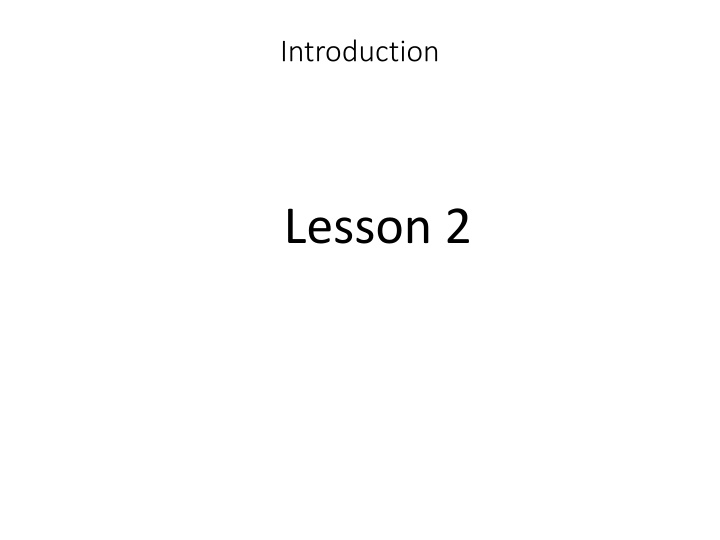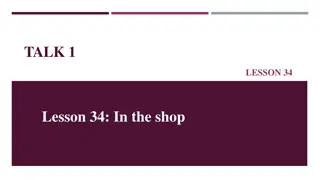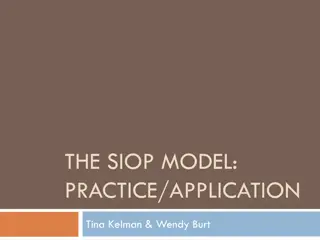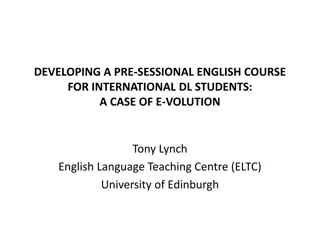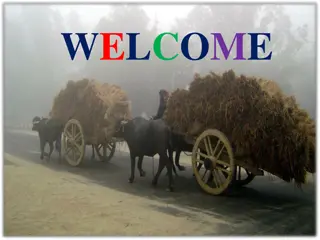English Language Learning Lesson Summary and Practice
This lesson covers various topics in English language learning, including simple present tense, questions, negative sentences, vocabulary related to the house, and practice exercises. It involves reading a story about shopping, practicing questions with "do" and "does," and understanding daily routines through images and sentences. The lesson provides opportunities for reviewing and applying learned concepts in a structured and engaging manner.
Download Presentation

Please find below an Image/Link to download the presentation.
The content on the website is provided AS IS for your information and personal use only. It may not be sold, licensed, or shared on other websites without obtaining consent from the author.If you encounter any issues during the download, it is possible that the publisher has removed the file from their server.
You are allowed to download the files provided on this website for personal or commercial use, subject to the condition that they are used lawfully. All files are the property of their respective owners.
The content on the website is provided AS IS for your information and personal use only. It may not be sold, licensed, or shared on other websites without obtaining consent from the author.
E N D
Presentation Transcript
Introduction Lesson 2
Introduction Review Unit 1 in Textbook What did we do in the last lesson? Simple present tense sentences, questions and negative sentences Yes, they are busy. Is he from Italy? You are not 19 years old.
Introduction Review Unit 2 in Textbook What did we do in the last lesson? Simple present tense sentences and house vocabulary. He works in a factory. Bedroom, kitchen bathroom
Introduction Let s Begin
Unit 3 Page 19 What do you see in the picture? There are 4 people in the picture. One person is pushing a shopping cart. The woman is holding a shopping list. They are in a supermarket.
Unit 3 Pages 20 and 21 Read the story on page 21 called Shopping. Write one sentence from the story for each picture on page 20. Check the answers on the next slide.
Unit 3 Page 20 - Answers Check your answers. 1. 2. 3. 4. 5. 6. 7. 8. 9. 10. Everyone helps with the groceries when they arrive home. 11. Mr. and Mrs. Baroni put them away. 12. Then they rest or have lunch. Mr. and Mrs. Baroni go shopping every weekend. They like to go to a large supermarket near their house. They park their car in a large parking lot. Robert usually pushes the cart. Bruno often forgets an item when he sees a pretty girl. They almost always buy vegetables, fruit, meat, eggs, and cheese. The shopping list is usually long. The checkout line is always long. After shopping, Roberto and Bruno usually go to the music store next door.
Language Tip Questions with DO and DOES WH questions are: who, what, where, when and why. WH questions often have DO. Usually, the answer does not have DO. Let s do a few practice.
Language Tip What does he do in the morning?
Language Tip What does he do in the morning? He reads a newspaper.
Language Tip When doeshe go hiking? (weekends)
Language Tip When doeshe go hiking? He goes hiking on weekends.
Language Tip What do they do on Friday nights?
Language Tip What do they do on Friday nights? They play pool on Friday nights.
Language Tip Where doesshe go during her lunch break? (coffee shop)
Language Tip Where doesshe go during her lunch break? She goes to a coffee shop during her lunch break.
Language Tip Where dothey want to go for summer vacation?
Language Tip Where do they want to go for summer vacation? They want to go to New York city.
Language Tip When do the students wake up on weekdays?
Language Tip When do the students wake up on weekdays? The students wake up at 6:06 am on weekdays.
Unit 3 Page 22 - Exercise A Practice writing answers to WH questions with DO or DOES. Tasks 1. 2. 3. Read the 12 questions in Exercise A. Write an answer for each question. Use the correct verb in each answer.
Unit 3 Page 22 - Exercise A Answers Check your answers. 1. 2. 3. 4. 5. 6. 7. 8. 9. 10. They look for interesting CDs. 11. Their parents wait in the car. 12. She wants to go home. They go shopping every Saturday. They park their car in the large parking lot. They go to the supermarket first. Roberto pushes the shopping cart. She reads the shopping list. They look for the groceries. He forgets an item when he sees a pretty girl. They buy vegetables, fruit, meat, eggs and cheese. After shopping, they go to the music store.
Language Tip Synonyms Page 23 Synonyms are two words that have a similar meaning. For example: big and large, old and young. I will show you some pictures with a word. Can you think of a synonym?
Language Tip Synonyms Fast
Language Tip Synonyms Fast Quick
Language Tip Synonyms Mad
Language Tip Synonyms Mad Angry
Language Tip Synonyms Many
Language Tip Synonyms Many A lot of
Language Tip Synonyms Small
Language Tip Synonyms Small Tiny
Language Tip Synonyms Supermarket
Language Tip Synonyms Supermarket Grocery store
Language Tip Synonyms Medicine
Language Tip Synonyms Medicine Drugs
Unit 3 Page 23 Exercise B Part 1 Tasks 1. 2. 3. Read the words at the top of page 23. Read the 8 sentences. Write the best word in each blank.
Unit 3 Page 23 Exercise B Part 1 - Answers Check your answers. 1. 2. 3. 4. 5. 6. 7. 8. entire near convenient items fruit meat vegetables Many
Unit 3 Page 23 Exercise B Part 2 In this reading exercise, you have to remember the story on page 21. Task 1. 2. 3. Read the words under part 2, from always to never. Read the story on page 21 one more time. Write the correct word in each blank.
Unit 3 Page 23 Exercise B Part 2 - Answers Stop the video and check your answers. 1. 2. 3. 4. 5. 6. 7. 8. 9. 10. sometimes always never usually usually often always seldom never usually
Unit 3 Page 24 Exercise C You will read a sentence and then write a question. Most of the questions have DO or DOES. For example: Rob always drinks coffee in the morning. Does Rob always drink coffee in the morning? They usually watch baseball on TV. Do they usually watch baseball on TV? Remember: Does with HE, SHE, IT, THE COMPANY, EVERYONE Do with YOU, WE, THEY, I
Unit 3 Page 24 Exercise C Task 1. 2. Read the sentences on page 24. Write a question for each sentence.
Unit 3 Page 24 Exercise C - Answers Your questions might be a little different. 1. 2. 3. 4. 5. 6. 7. 8. Do they go shopping every Saturday? Do many families shop on Saturday? Does Roberto usually push the cart? Does Bruno often forget an item? Do they usually buy fruit and eggs? Does Bruno like classical music? Does everyone help with the groceries? Do the boys carry the groceries to the apartment?
Unit 3 Page 25 Exercise D This is a thinking and writing exercise. You have to put the sentences in order: first, second, third, fourth. Tasks 1. Read the sentences on page 25. 2. Put the sentences in order. Write 1, 2, 3, or 4. 3. Write the sentences in order in your notebook.
Unit 3 Page 25 Exercise D - Answers Stop the video and check you answers. a. b. 3, 1, 4, 2 2, 4, 1, 3
Unit 3 Pages 26 and 27 Model 3 This a reading and writing exercise. Tasks 1. Read the story on page 27. 2. Look at the pictures on page 26. 3. Write one sentence from the story for each picture in your notebook.
Unit 3 Pages 26 and 27 Model 3 - Answers Stop the video and check your answers. 1. 2. 3. 4. My grandmother goes shopping everyday. She goes from shop to shop with her basket. At the grocery store, she buys milk, fruit, vegetables and meat. At the drugstore, she often buys toothpaste, soap, or medicine for my grandfather. He is often sick. She goes to the hardware store if she needs nails or screws. She goes to a small cafe after she finishes her shopping. Some of her old friends are usually there. 5. 6. 7. 8.
